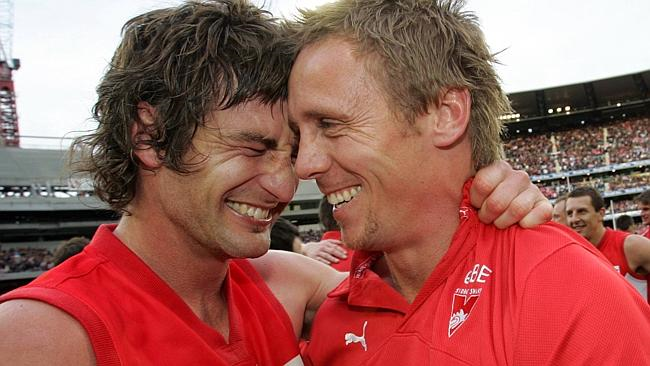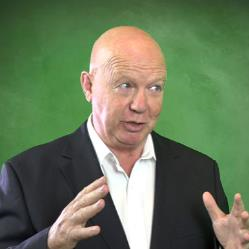
Sydney Swans captains Brett Kirk, left, and Stuart Maxfield after the 2005 AFL grand final[/caption]
"A good sales captain is Caring, Courageous and Consistent" - Interview by John Smibert
 In my last discussion with Wayne Moloney he told us that the leading sales managers are great team captains. He mentioned the 3 'C's of a team captain - 'Caring', 'Courageous' and 'Consistent'. So I asked him to come back and talk about these.
In my last discussion with Wayne Moloney he told us that the leading sales managers are great team captains. He mentioned the 3 'C's of a team captain - 'Caring', 'Courageous' and 'Consistent'. So I asked him to come back and talk about these.
This interview is what resulted - I think you will like it.
Wayne explained what he means by the three 'C's as they relate to a sales manager - or team captain - and talks about how a sales manager who displays these three characteristics will lead his/her team to success.
View the discussion below. This interview is likely to be of interest to the CEO, CSO, CMO, COO and CFO, sales leaders and sales managers.
Wayne Moloney is a leading business strategist specialising in sales and business development. Wayne has a very specific specialisation in 'lean selling'.
See more of the 'TALKING SALES' video series here
Interview:
John: Hello, I've got Wayne Moloney with me again - welcome back, Wayne!
Wayne: Hi, John!
John: Hey Wayne, last time we met we discussed the second chapter of your book, and it was all about being a team captain.
Wayne: Yes.
John: Now, you mentioned late in that discussion that a captain needs to have the three Cs. If I remember them, they were 'Caring', 'Courageous' and 'Consistent'.
Wayne: That's right, yes.
John: Could you give us some insight and what you mean by those three associated with being a good team captain?
Wayne: Yes. John, again, I refer this back to a sporting environment as well, which is very similar to what we're talking about in a sales team environment. A good captain needs to be caring about the individual team members, they need to be able to acknowledge the strengths and weaknesses of that person in a way that is not belittling to the person, in a way that helps them develop, but they need caring in a lot more areas as well. They need to care about the company they're working for, they need to care about sales as their career, they need to care about the customer, and that's really most important; they've got to have that caring environment, as far as everything within the organisation is concerned.
John: As you talk about that, old sales managers I've worked with in the past come to mind, and some of them were brilliant, caring people. They really made me what I am, because they not just mentored me, they really cared and they understood and they wanted me to be successful; they were pitching for me the whole time.
Wayne: Yes. And look, a good manager is not just about managing results; a good manager is about helping you develop, and they can only do that if they care about your personal development, as distinct from just the overall development. Yes, they've got to manage for team success, but they get that by each individual getting the best out of them.
John: And I also understand the demonstrating the caring you've got for your own company, your own products, your customers, and driving value for your customers; if you care deeply about all of that, it will rub off on your team.
Wayne: One would hope so, yes.
John: Okay, that's the first C. The second C was courageous.
Wayne: It is. You mentioned about sales managers you've worked for, and sales managers I've worked for as well. The guys that aren't afraid to step up and the guys that aren't afraid to say, "That was my fault," first up, they're also guys that are quite happy to back their sales team, both outside with the customer and in the marketplace, and also defend them internally. But they're also courageous to make the tough calls.
John: Yes, yes.
Wayne: And some of those tough calls may be that they've got to do something about an underperforming salesperson. That seems at times at conflict with caring, but it's not really, because if you care for the person and you've got the courage to make the call, everyone's going to be better off.
John: And the fact is, the rest of the team will be better off. If you've got somebody dragging the team down, and you do something about that, the rest of the team are going to feel more cared for.
Wayne: Yes. So, that courage is courage of your commitments, courage to step up and say, "I was wrong," courage to defend your team, inside and outside, and courage to make those hard decisions.
John: And inside is very valid. I know that you've got a lot of pressure coming down from management, and you really need to take that pressure off the sales team, don't let that flow through the sales team, so you need to have that courage, facing upper management, as a sales manager.
Wayne: Yes, very much so.
John: Okay. The third C was consistency.
Wayne: Yes. Over my career, and I'm sure over yours, you've worked with sales managers that have got almost one set of rules for some people and another set of rules for others; maybe the lone wolf, the high performer is allowed to get away with things that the others aren't. At the end of the day... Michael Jordan once said that individual brilliance will win games, it's only a great team that'll win championships.
John: Absolutely true, isn't it?
Wayne: Yes. So, if you let that lone wolf, that high performer, get away with things that the others don't get away with, you're going to create an inconsistency, and you're going to get people not wanting to perform for the benefit of the team. You need to be consistent with the messages that you put out, you need to be consistent with the way you manage the individual performance of each team member, you need to be consistent with the way you develop and coach the people. You don't want to give more to one person, in an uneven way, than what you're doing to others. I mean, some may need more, but people will understand that.
John: Yes, I was going to say. I mean, different people need different things, so you are going to treat people differently to some extent by addressing their needs, through the caring process and so on, but what you're saying is you need to be consistent about the way you do that, even if you're doing different things with each person, and not letting people get away with things that other people you're not.
Wayne: Yes. And you need to be consistent with the message that you take to the marketplace and how you represent your team internally, as we spoke about when we mentioned courage.
John: Yes. So, the consistency a message to your customers, to your market, and consistency a message back up into your own organisation.
Wayne: Yes, very much so.
John: Okay. So, they're the three Cs. Again, we've got 'Courageous', 'Consistent', and the first one was?
Wayne: 'Caring'.
John: Caring.
Wayne: Yes.
John: Wayne, I like the three Cs. I think it'll really help the team captains be better captains by concentrating on those three - thank you very much!
Wayne: Thanks, John!
John: Next we'll talk about your third chapter in your book, which is planning.
****************
More interviews with Wayne Moloney:
***************

Your Invitation: I invite you to join the Sales Leader Forum group on LinkedIn where you can experience informative discussions with your peers and sales thought leaders on subjects like the one we have discussed here. I also invite you to subscribe to the
- Sales Leader Resource Centre here
- Sales Leader YouTube channel here (300+ sales leadership videos)
Please Share: If you valued this article, please share via your Twitter, LinkedIn, Google+ and Facebook social media platforms. I encourage you to join the conversation or ask questions. So feel free to add a comment on this post - I promise to respond. If inclined please follow my LinkedIn post page here.
Want to touch base? If you have questions please feel free to contact me - email: john.smibert(at)salesleaderforums.com, Phone: +61 404857893 or Skype: john.smibert